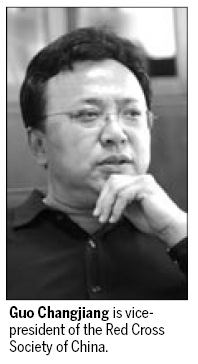China
China's charities among the needy
By Lian Mo (China Daily)
Updated: 2010-11-03 10:55
 |
Large Medium Small |
BEIJING - As the number of complaints grows about the stringent rules to establish a grassroots organization in China, a leader of the nation's only Red Cross society admitted that deregulation would greatly help develop charitable groups.
Guo Changjiang, vice-president of the Red Cross Society of China and director-general of the Chinese Red Cross Foundation, said "more room to grow and functions should be allowed for mature grassroots charities which have good reputations and standard operations".
The comments come on the heels of kungfu star Jet Li's televised complaints in September that it was very difficult for him to operate his One Foundation, which is not a grassroots charitable organization but a fund to help disaster victims. The actor said he cannot raise money by himself because his foundation isn't public and that it must have the backing from a government department and at least 8 million yuan ($1.2 million).
"The requirements and procedures for registering non-government organizations (NGOs) could be reduced," said Guo, adding that it was still vital for the government to provide help for charitable organizations.
The Red Cross Society of China is a humanitarian relief organization and auxiliary to the government in charitable work. It is also one of China's most influential charities. It received more than 19 billion yuan for 2008 Wenchuan earthquake victims, one-fourth the total amount of donations that year. The tremor, which killed at least 68,000 people in Sichuan province, was both a turning point for the government's disaster relief efforts and an outpouring of help from the public.
But for smaller humanitarian groups, there are a number of obstacles that the central government has put in place to weed out shady organizations intent on getting tax breaks.

Under the country's rules, a charitable organization has to be affiliated with a government department before they can register with the Ministry of Civil Affairs as an NGO. If the organization wants to raise public funds, it also needs about 8 million yuan to operate on the national level and 4 million yuan to operate on the municipal level. They also face other requirements, such as verifying what the organization will be engaging in.
Many representatives from grassroots organizations have said that it is very difficult to find a government institution willing to take responsibility for them. Even the celebrity status of Jet Li was not able to secure governmental support. Three years ago, he said he had to cooperate with the Red Cross Society of China to use its account to raise funds. Many of the groups, however, are waiting anxiously to see how the national charity legislation, now in the draft stage, develops. The law aims to loosen regulations on the registration system for charitable organizations.
"About 99 percent of overseas charities in China do not have legal identity because no government department wants to be affiliated with them," said Yang Tuan, a researcher of the Social Policy Research Center at the Chinese Academy of Social Sciences.
Guo agreed that some grassroots charities face tough legal restrictions, but added that it's to be expected because China is in its infant stages of developing and regulating charitable organizations.
"Before the 2008 Wenchuan earthquake, civil society's ability to help was hardly seen in providing assistance to disaster victims. It was always the government's job to help the vulnerable groups," he said. "Civil organizations in China played an unprecedented role in the earthquake."
Guo said the 2008 earthquake played a major role in boosting China's charitable spirit. A number of charities sprang up in short order. The problem, he said, is that many grassroots organizations then and now are not equipped to handle their roles and responsibilities.
The former secretary-general of the All-China Youth Federation, Guo said he has had many chances to talk to enterprises willing to donate.
"Most of them are willing to donate and do charity work, but they think there are only few suitable (NGOs) with public credibility and influence to fulfill their willingness to help. They do not want to give money to grassroots organizations because the trust has not established," Guo said.
Many believe China's nonprofit organizations lack professionalism and do not have trained personnel to handle charity work and raise funds.
Sun Zhongkai, director of Beijing Stars and Rain, an NGO helping autistic children since 1993, said that the management of grassroots charities basically depends on each organization's consciousness and self-regulation. "The charity sector in China is disordered to some extent," he said.
"On the one hand, it is good to have a policy that allows more grassroots charitable organizations to emerge and do their jobs. On the other hand, because many charities do not have the resources to do that kind of work, strong supervision and administration from both the government and society is necessary."
Wang Zhenyao, head of the Beijing Normal University's One Foundation Community Research Institute, said that courses about NGO and civil organization management are very rare in China's universities.
"This is part of the reason why Chinese NGO workers sometimes are not professional enough."
China Daily